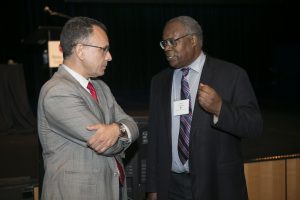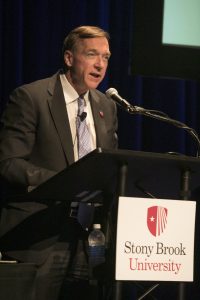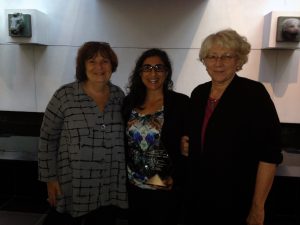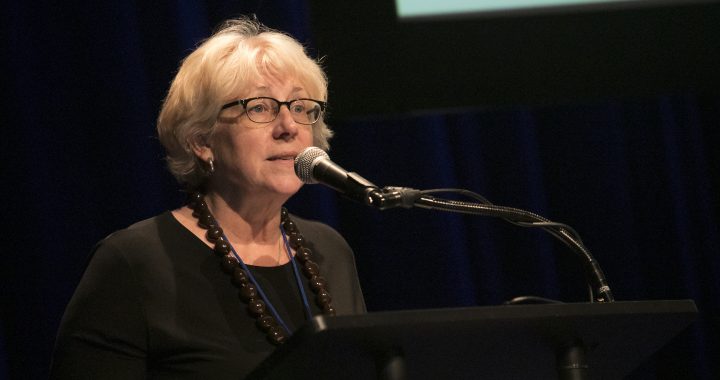The 2017 SENCER Summer Institute, hosted by Stony Brook University on August 3-6, brought together more than 200 participants from more than 100 institutions to hear from experts about issues of critical importance in STEM education, learn more about SENCER programs, interact with members of the community, and share project outcomes and best practices. This Institute was the first to be held at Stony Brook University, where NCSCE is now based.

Dr. Fotis Sotiropoulos and Dr. David Ferguson
This year, the Institute was preceded by a new workshop on the morning of August 3rd, Excellence and Diversity in Engineering Education: Academia, Industry, and Government. It was convened by David Ferguson, chair of the department of Technology and Society and Associate Provost for Diversity and Inclusion at Stony Brook University. The workshop convened leaders in engineering and related disciplines from colleges and universities around the country as well as representatives of professional associations to discuss and work together on topics such as vertical integration, project-based learning, and engineering and technology for social good.

President Samuel L. Stanley
The Institute began formally with a welcome to Stony Brook University by President Samuel Stanley, who explored the global importance of STEM to addressing the challenges we face. Following his remarks, NCSCE Executive Director Eliza Reilly shared information on the Center’s new programs as well as the continued strengthening of our core work in faculty development and curricular innovation. These themes were reflected in the SSI program, which included vibrant discussions on graduate education, K-12 applications of the SENCER approach, informal education collaborations, interdisciplinary projects, among many other topics. The new projects and curation of the Institute program connect to the mission of the Center to empower citizens as responsible, lifelong learners who can apply the knowledge, values, and methods of science to the complex civic challenges facing our democracy. Dr. Reilly also acknowledged the new additions to the SENCER model series, a course on Ecotoxicology by Dr. Sharon Pochron, and Field & Natural Science, a course for pre-service middle school teachers by Dr. Sarah Haines. You can read more about the models and access all materials here. The opening plenary address was delivered by Fotis Sotiropoulos, Distinguished Professor and Dean of Engineering and Applied Sciences, who discussed the role of educational institutions in developing civic capacity and awareness in STEM learning, and the humanitarianism that should be ever present in the profession of engineering
The second day of the Institute began with a plenary address from Elyse Eidman-Aadahl, Executive Director of the National Writing Project, who spoke to participants about communities of practice, improvement infrastructures, and the capacity of networks to catalyze change. Through an engaging conversation, she encouraged all attendees to ponder a thought provoking series of questions that can be applied to formal education, informal education, and beyond – How we can we improve improvement? How can we improve human systems? How can we get better at getting better? The rest of the day was filled with sessions delivered by SSI participants and experts in the SENCER community on a wide range of topics such as assessment, STEM and Humanities collaborations, and career success. Friday also included a poster session with more than 25 posters about SENCER work being done on campuses and around communities. The poster session was followed by a trip for participants to a nearby beach for some relaxation and networking time.
The third day of the Institute started with a plenary panel on the origins and development of communities of transformation in undergraduate STEM reform. This panel was related to research conducted by Dr. Adrianna Kezar and Dr. Sean Gehrke funded by NSF that named SENCER as one of four communities of transformation in STEM reform. The panel included Myles Boylan, Lead Program Director, Division of Undergraduate Education at the National Science Foundation, Karen Kashmanian Oates, Professor of Arts and Sciences at Worcester Polytechnic Institute, and Marcy Dubroff, Deputy Executive Director of The POGIL Project, which was also included in the communities of transformation study. During the afternoon, David Asai, Senior Director for Science Education at the Howard Hughes Medical Institute, delivered a plenary address, “Race Matters,” about the need for diversity and inclusion in STEM. Dr. Asai noted that science should be about creativity and innovation, and that “diversity is required for scientific excellence.” SSI participants grappled with the issues raised by Dr. Asai regarding our roles in improving inclusion throughout the remainder of the Institute, and in the time that has past since the closing events. This will continue to be a focus of our discussions and work in the near future.

Dr. Karen Kashmanian Oates, Dr. Katayoun Chamany, and Dr. Eliza Reilly
The remainder of Saturday, August 5th included more sessions and workshops on topics such as teaching students about the recent solar eclipse, implementing active learning, and engaging in strategic conversations. Saturday concluded with the annual Dinner Recognizing Achievements in the NCSCE Community. At this year’s dinner, Monica Devanas, a previous recipient of the William E. Bennett Award, announced the recipient for this year, Katayoun Chamany of The New School.
The final day of the Institute began with a plenary address delivered by Dr. Chamany. In describing how her involvement with SENCER impacted her career, she talked about some of her ongoing work at The New School, including Stem Cells Across the Curriculum, working on the intersection of science and social justice. We encourage you to visit the site linked above for Stem Cells Across the Curriculum to explore teaching notes, materials, and content connections that may help your students engage in these issues. Sunday’s sessions and workshops addressed topics including leading change on campus, and SENCER for upper-level courses.
Selected presentation materials are available to view online in the NCSCE Digital Library.
Photographs of Dr. Eliza Reilly, Dr. Samuel Stanley, Dr. Fotis Sotiropoulos, and Dr. David Ferguson courtesy of Stony Brook University. Photograph of Dr. Karen Kashmanian Oates, Dr. Katayoun Chamany, and Dr. Eliza Reilly by NCSCE staff.

